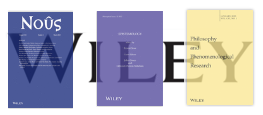Sosa Comments on Experiences with Wiley
Ernest Sosa (Rutgers), the longtime editor-in-chief of Philosophy and Phenomenological Research and Noûs (and editor of its supplement, Philosophical Issues), journals published by Wiley, offers a comment in light of what is happening at The Journal of Political Philosophy:
 He says:
He says:
I have long been Editor of Philosophical Issues, and Editor-in-Chief of Nous and PPR. For many years now, Wiley has been the publisher of all three of those journals. And I am pleased to attest that our experience with Wiley’s editorial representatives has been uniformly excellent in every way. In particular, we have never experienced any pressure to adjust our editorial policies and procedures to any business objectives. At all three journals we have always enjoyed complete editorial autonomy. I can speak from firsthand experience only about these three journals, but that is what I can say based on my long experience.
Ernie Sosa
Editor-in-Chief, Nous and PPR
Editor, Philosophical Issues



I respect and admire Ernest Sosa for the amount of work, time, and resources he has put in at Nous and PPR. But having the same person as an EIC at two of the most prestigious journals in philosophy cannot be healthy for the discipline.
The first and second claim here are at least in dire tension with one another, and require argued reconciliation instead of mere anonymous declaration of their supposed truth. Sosa’s name is attached to his comment. Mine is as well to this reply. I realize that states of affairs in the academy produce structural differentials of power that necessitate anonymous comments; but the piling on of “likes” does irk me without any discussion of why the piling on is justified. Is it not possible that one editor can do a fair job even with respect to two powerful journals? Why should that be impossible, as “cannot” implies?
How are they in tension?
Are you asking for an explanation for why the concentration of power is undesirable, particularly in contexts where nepotism remains a perennial concern?
Rhetorical question.
Undesirable in one respect vs Undesirable all things considered vs Cannot be healthy?
Respectfully, Alan, there is no tension. The first sentence is a judgement about the merits and contributions of an individual. The second is a structural/procedural claim about concentrations of influence and editorial judgment.
I’ve also posted under my own name, and I certainly don’t expect Ernie to take any offense. He was a good graduate coordinator when I first knew him, and he and his wife were great landlords when I rented from them.
Thank you Derek (if I may).
Similar problem to JPP, Ethics, and PPA having significant overlap in associate editors and editorial board membership. Why keep one gate when you can keep 3?
There are 12 gates at Nous and PPR, 12 Editors with full parity and authority, 12 independent gates with no overlap.
I think there is no overlap between the associate editors of JPP and PPA, one person who’s an assoc ed of JPP and Ethics, and one who edits both Ethics and PPA.
(It’s possible I missed someone.)
Why must it be unhealthy for the discipline? The mere concentration of power is not itself bad, especially when there are other checks and balances, and especially when it is concentrated in the hands of the competent. That PPR recently went from 5th to 3rd ranked in Leiter’s 2022 poll suggests that many regard his influence to be good rather than bad.
Does the editorial autonomy of these journals imply that there has been no pressure to accept more papers? If so, then I’m confused as to the point of the statement. Wiley has asked JPP to accept more papers, that is established. The editors’ worry is that Wiley’s interest in increasing the publishing rate will override editors’ autonomy to decide about a paper’s publishable quality, no? If it really is the case that only 24 papers a year (as was published by JPP in 2022) is deemed of publishable quality, and any more would mean that papers deemed unpublishable will be published (because of Wiley’s demand), then editors don’t seem to have editorial autonomy. If Sosa’s statement is supposed to lighten the critique against Wiley, shouldn’t it communicate something more like “these journals have also been asked to accept more papers for publication, but the journals have retained editorial autonomy nonetheless. No need to panick. Wiley are reasonable people”. If Sosa’s journals have not been asked to publish more, then his statement doesn’t seem to do much good in the present case. Am I missing something here?
I’m very happy to learn from Prof. Sosa’s comment that, like the proverbial curate’s egg, some parts of Wiley’s engagement with philosophy journals are excellent. My concern is with the parts that are less exemplary.
Moreover, if Wiley is unambiguously committed to the principle of editorial autonomy in the case of Noûs and PPR, that is all the more reason for it to be committed to the same principle in the case of JPP (and PPA).
Ask Sosa who owns Nous and PPR, and the answer might explain the puzzling difference in Wiley’s attitudes toward JPP and Nous/PPR.
For those of us who don’t know: who owns them?
No, in the case of these journals, Wiley has not used their ownership to exert any editorial pressure at all. When ownership of Nous passed to Blackwell from its founder, Hector Castañeda, for example, that had no effect whatever on the editorial side, and that is how it is to the present day, even when Blackwell transitioned to Wiley-Blackwell.
Then the question is whether the terms of transfer of ownership impose a certain condition concerning editorial independence. Castañeda may have seen the need for it.
Besides, isn’t PPR owned by PPR Inc.? Don’t the bylaws for PPR Inc. include a clause on editorial independence?
Btw, you should disclose any possible conflicts of interest you may have in this case. Are you a co-owner of PPR Inc.? Is Wiley also a co-owner?
I saw from this website that both PPR and Nous are leaving Wiley’s and moving to Substack. Could anyone confirm this?
That is an April Fool’s post. The journals are not moving to Substack.